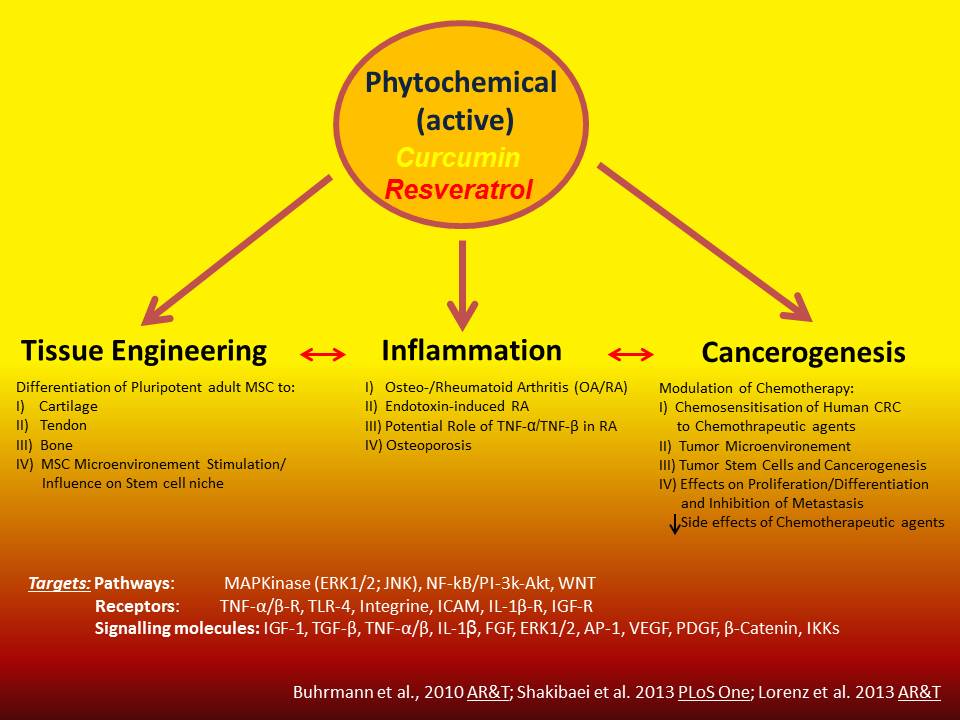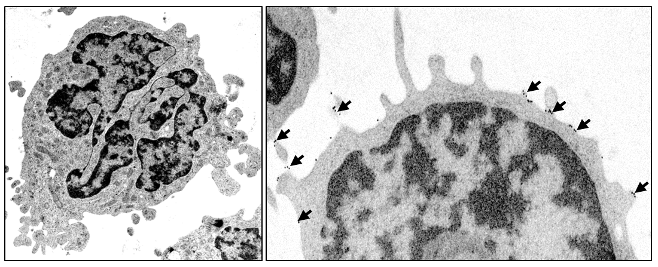Tumorbiology and phytochemicals (natural polyphenols)
Research Group Professor Dr. M. Shakibaei
Musculoskeletal- & Tumor Biology Research Group
Team members:
Univ. Prof. Dr. Mehdi Shakibaei (Research Group Leader)
LUDWIG-MAXIMILIANS-UNIVERSITY MUNICH,
Faculty of Medicine, Institute of Anatomy,
Pettenkoferstrasse 11, D-80336 Munich, Germany.
Phone: (089) 2180 72 624
Fax.: (089) 2180 72 625
E-Mail: mehdi.shakibaei@med.uni-muenchen.de
PD Dr. med. vet. Constanze Buhrmann (Postdoctoral fellow)
Phone: (089) 2180 72 626 or 72 674
E-Mail: constanze.buhrmann@med.uni-muenchen.de
Mrs. Christine Meyer (Scientific officer)
Phone: (089) 2180 72 626 or 72 674
E-Mail: christine.meyer@med.uni-muenchen.de
Mrs. Aranka Brockmüller (Doctoral candidate and Technician)
Phone: (089) 2180 72 674, 72 671
E-Mail: aranka.brockmueller@med.uni-muenchen.de
Papers: Publication list
Current Research Collaborations:
Prof. Dr. med. Ralf Stahlmann: Institute of Clinical Pharmacology and Toxicology, UKBF, Charite Universitätsmedizin Berlin, Germany.
Prof. Dr. Michael Schäfer: Department of Anesthesiology and Intensive Care Medicine, Charité Universitätsmedizin Berlin, Germany.
Dr. Andreas Eimannsberger: Institute of Anatomy, Ludwig-Maximilians-University Munich, Germany.
Dr. Wolfgang Lorenz: Institute für Innenraumdiagnostik, Düsseldorf, Germany.
Prof. Dr. med. Bharat Aggarwal: Cytokine Research Section, Dep.of Molecular Oncology, University of Texas M.D. Anderson Cancer Center Houston, USA.
Dr. Ajay Goel: Gastrointestinal Cancer Research Laboratory, Division of Gastroenterology, Baylor Research Institute and Charles A. Sammons Cancer Center, Baylor University Medical Center, Dallas, USA.
Prof. Dr. Parviz Shayan: Department of Parasitology, Faculty of Veterinary Medicine, University of Tehran, Iran.
Prof. Dr. Ali Mobasheri: School of Veterinary Medicine and Science, University of Nottingham, UK.
Prof. Dr. Ajaikumar Kunnumakkara: Cancer Biology Laboratory, Indian Institute of Technology, Guwahati, India.
Prof. Dr. Peter Kubatka: Department of Medical Biology; Jessenius Faculty of Medicine, Comenius University Bratislava, Slovakia.
Prof. Dr. Dietrich Büsselberg: Weill Cornell Medicine, Doha, Qatar
Main Research Topics:

Project 2: Tumorbiology and phytochemicals (natural polyphenols)
A: Chemosensitisation of colorectal cancer cells through phytochemicals
B: Influence of the tumor microenvironment on tumor cells
Colorectal cancer is the third most common cancer worldwide. In Germany it is the second most prevalent cancer, afflicting more than six percent of all germans in their lifetime. Exploring the pathogenesis of cancer has led to the identification of novel intracellular proteins, thus enabling the development of new pharmacologically active components for therapy and prevention.
It has been reported that in addition to genetic alterations, thus real mutations, the majority of colorectal cancer is due to epigenetic changes which take on a major role in pathogenesis. The specific pattern of genetic and epigenetic changes could be predictive of the behavior of the tumor and its response to various chemotherapeutic agents.
Herbal remedies (such as the natural polyphenols curcumin or resveratrol) inhibit the nuclear-transcription-factor kappaB (NF-kB), which plays a central role in proliferation, survival and drug resistance of tumor cells, as well as during angiogenesis in tumors. It is known, that phytochemicals (curcumin, resveratrol) induce apoptosis of tumor cells. Curcumin for example inhibits NF-kB, which is activated by cytokines and carcinogenic substances, inhibits apoptosis of tumor cells and reduces chemoresistance. It thus promotes apoptosis and sensitizes tumor cells to chemotherapeutic agents.
Since the 1990s, colorectal cancer is treated with adjuvant therapies of 5-fluorouracil (5-FU) and leucovorin. Today the standard treatment protocol consists of the so-called FOLFOX-4 protocol, (5-FU / leucovorin plus oxaliplatin).
In our project several colorectal tumor cell lines are checked for their chemosensitivity in the presence and absence of phytochemicals and intracellular mechanisms leading to apoptosis or chemoresistance of cells elucidated.
Presentation of projects:
2A: Chemosensitisation of colorectal cancer cells through phytochemicals
Colorectal cancer is the third most prevalent cancer worldwide and one of the major causes of tumor related morbidity and mortality. In our project different colorectal cancer cell lines cultured in two- or three-dimensional models are investigated for their chemosensitivity towards different drug treatments and intracellular mechanisms leading to apoptosis or chemoresistance of cells elucidated. Drug treatments may comprise standard chemotherapeutic agents such as 5-fluorouracil, oxaliplatin, and combinations thereof, as well as phytochemicals (resveratrol, curcumin and their combinations). Evaluation of these results is carried out by means of light microscopy, immunofluorescence, electron microscopy, immune electron microscopy and western blot analysis.
2B: Influence of the tumor microenvironment on tumor cells
In this project we explore how cells of the surrounding connective tissue interact with the tumor cells. Experiments are carried out in an indirect co-culture model (High Density Culture), which allows the cells to exchange mediators and metabolites via the culture medium (paracrine signaling) without direct contact between the tumor cells and the stroma cells.

Colorectal cancer cells (HCT116), Immunodetection of colon cancer stem cells (CD133 positive cells)
Methods:
1: 2D and 3D culture models (Monolayer-, High Density- & Alginate Cultures),
2: 3D culture model mimicking the metastatic tumor microenvironment in vivo,
3: Morphology (Light- and Electron microscopy),
4: Immunmorphology (Immunfluoresence and Immunolectron microscopy),
5: MTT-Assay,
6: Gelelectrophoresis, Western- and Immunoblotting,
7: Immunoprecipitation.

